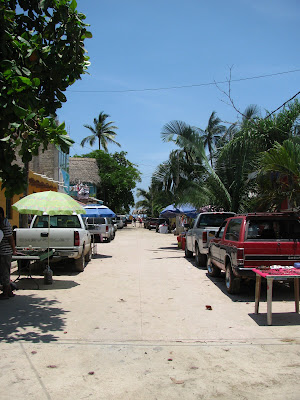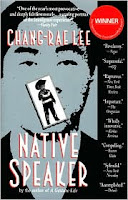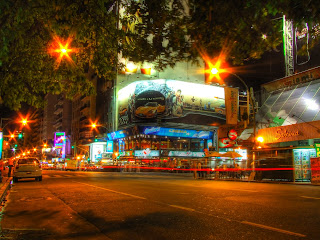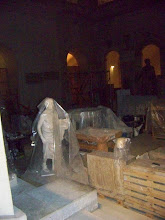Oh, and across from our balcony I was struck by this image of chairs on a rooftop.

That's essentially what we do with our camera, we capture images that strike us, no matter where we are. I’ve traveled to a lot of places, sometimes famous places like Paris or Buenos Aires, and my friends are disappointed that I never take a camera, and if I do, I come back with pictures not of the famous landmarks but of images that I like.
Sometimes people take pictures of the famous landmarks just so they can go back home and show their friends that they were there, and sometimes I even hear that among tourists, “Now we can say we saw the Eifel Tower!"
I don’t come back with pictures of the Eifel Tower or tango dancers, because if that’s what one wants, one could Google image search and find plenty of them, from photographers much more able than me.

Why enter a new city only to experience the images one has had before even entering the city?
Whenever possible, I liked to submit to a city, to feel its spirit and its rhythms, and to move through its streets and corridors according to how they city teaches me to move, not according to images that I have already had before I came.
You must see this, then this, then this!
Then you can tell your friends you have seen the city.
I remember the first time I got back from Paris, and someone asked me, “Did you visit the Eiffel Tower.
“No,” I said. “I didn’t get around to it.”
“Oh,” they said, deflated.
But I drank beers in a bar with second generation African immigrants, in a neighborhood where there were no white people, let alone tourists, where on the corners boys dressed hip-hop style and listened to rap en francais, and one of the guys I drank with, an older man who lived on the edge of the city, took me for a ride in his rickety old car, zipping in and out of Paris traffic, until we ended up on a dimly lit street in a poor neighborhood and stopped at a Guadeloupe restaurant where he knew the owner, and where we all drank strong fruity drinks from his country until we are all very drunk.
One cannot experience the spirit of a place if the images and expectations of the place come from without, that is, if the cultural meaning of a place is already fixed.
So I'm afriad to say, I have no pictures of Puerto Vallarta, but I found this one on Google.

Pretty, ain't it?
In fact, when I go to a new place I don’t even like to bring a camera, because I want to experience the place, to feel it, and if I’m struck by some experience, I would rather write about it, or just remember it, let it exist as a memory within me. Some mystics say that our souls are made up of memories, so even if I don’t remember every detail of an experience, it becomes part of me, my spirit.
Memories co-create me.
However, a few days ago, Sasha and I had to be like tourists with a camera.
We had to bring a camera with us on what was supposed to be an afternoon excursion to Sayulita, a small town about an hour away from PV.
See, our friend Agustin F. Porras used to live there when he received a fellowship that would support him to do anything he wanted for about a year (yeah, he’s one of those genius types). The only scholarship I ever got as a student I had to pay back after graduation.
It was called a student loan!
With this fellowship money, he got in his VW bug and drove through Mexico, ending up in Sayulita, a small beach town in Nayarit, where he would spend a year, reading, thinking, writing poetry. I had met Augie in the MFA program at the University of Oregon, where the three of us, him, me, and the late poet Andrés Montoya where the only Chicano students in the program.
In Sayulita, he lived underneath a palapa, a grass hut without walls, sleeping on a hammock. He read all 1,000 pages of Don Quixote, he told me, the entire story, while he was there in the jungle.
“You should read it,” he always tells me.
Now, he wanted Sasha and I to go to Sayulita, to see what it was like, to go see if we could find any of the people he knew. He gave us names of expats who owned restaurants or coffee shops, and told us to ask them if they remember him. It was quiet and small, he always told me, and many places didn’t have running water or electricity.
For a year he ate fish he caught with his hands and drank coconut milk from the shell. He took walks in the jungle, a machete in one hand, and with the other he brushed off the scorpions that fell from trees onto his shoulders, and he danced around snakes that shot out from the rocks.
Okay, so maybe I’m exaggerating.
He didn’t say it was quite that way, but he did say that to see Sayulita I might be able to understand him a bit more, because who he is now was probably influenced a lot by that place.
Augie is one of the most Zen people I have ever known. He’s kind, patient, and always at peace, so we agreed to go to Sayulita, maybe see the place that taught him to be at one with everything, maybe get a bit of the magic for ourselves.
Take pictures, he said, and he didn’t mean the artsy-fartsy pictures I usually take of chairs on rooftops.
So, all this has been a very large introduction to sharing the photos we took.
These are for you Augie.
Sayulita.
We got out our camera, got on the bus in PV, and we arrived late afternoon on a very hot day.
The bus dropped us off by a bridge. Here’s the first thing we saw.

.JPG)
Once we crossed over the bridge we found ourselves in a small town, which seemed very slow and quiet.


And very Mexican.


After crossing through the town, we made it to the beach.



Here's an image I knoow Augie will like.

Augie's all about the duende.
Although he might be disspaointed that one of the boys in the image is texting.
They didn't even have telephones when Augie lived there.
Actually, the ATV above probably breaks his heart.
(Tomorrow I'll add more Sayulita images. Remember we were only going to spend an afternoon?
Well, things got a little weird and...well, I'll tell you about it in the next entry.
Virtually See you then.
Chacon)
















.jpg)






























